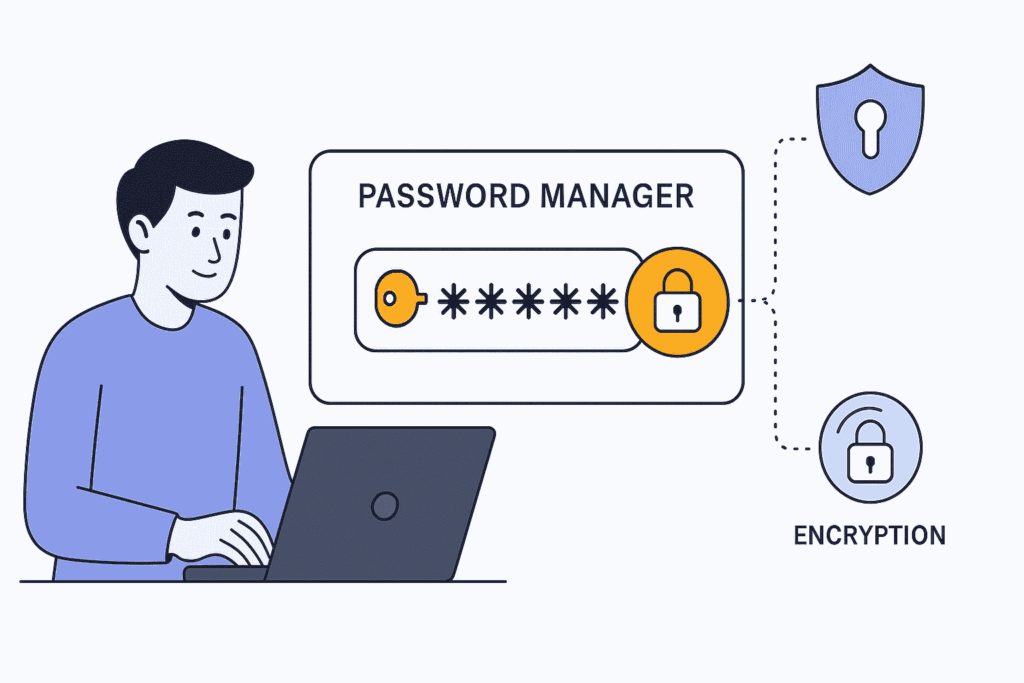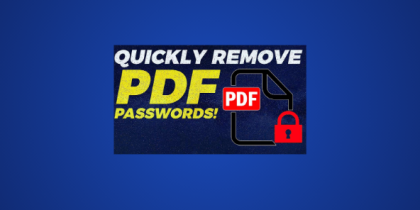Most people rely on their browsers to store passwords. Chrome, Firefox, and Safari offer to remember login details and autofill them later. While convenient, browser-based password storage has significant security and privacy limitations.
If you want a safer way to store all your passwords in one place without relying on your browser, the best option is to use a dedicated password manager. PureVPN Password Manager provides a secure vault with strong encryption, device independence, and centralized access to all your credentials.
This guide explains why browser storage is risky, how a dedicated password manager works, and how to migrate your passwords into one secure, encrypted location.

Why You Should Avoid Storing Passwords in Your Browser
Storing passwords in your browser seems easy, but it introduces multiple security risks.
1. Limited Encryption
Most browsers do not use strong encryption to protect your saved passwords. In many cases, if someone gains access to your device, they can view your saved credentials without needing a master password.
2. No Zero-Knowledge Architecture
Browsers do not use zero-knowledge encryption, which means the software provider can technically access your stored data. Dedicated password managers like PureVPN use a zero-knowledge model, ensuring only you can decrypt your data.
3. Sync Issues and Ecosystem Lock-In
If you save your passwords in Chrome, they’re not easily accessible from Firefox or Safari. Similarly, Safari stores passwords via iCloud Keychain, which is exclusive to Apple devices.
4. Lack of Security Audits and Breach Alerts
Browsers do not alert you if a password has been reused, is weak, or appears in a data breach. Password managers offer password health audits and breach monitoring tools.
5. High Vulnerability to Phishing
Browser autofill is domain-based but not always context-aware. Sophisticated phishing sites can trick browser autofill to release your credentials. A password manager verifies the domain more strictly before filling in any details.
What Makes Dedicated Password Managers Safer?
Dedicated password managers such as PureVPN Password Manager are built specifically to secure login credentials. They store passwords in a centralized vault, protected by AES-256 encryption and accessed only through a master password or biometric login.
Key Advantages:
- End-to-end encryption
- Device-independent access
- Biometric security
- Encrypted backups
- Password generator
PureVPN Password Manager adds another layer of security with its zero-knowledge framework. No one including PureVPN can see or decrypt your saved credentials.
How to Move All Your Passwords into One Secure Place
Migrating from browser storage to a secure, dedicated password manager is straightforward.
Step 1: Export Passwords from Your Browser
Most browsers allow you to export saved passwords as a CSV file. Handle this file carefully and delete it after import.
Step 2: Import into PureVPN Password Manager
Open PureVPN Password Manager, upload your CSV file, and your credentials will be encrypted and organized in your vault.
Step 3: Set a Strong Master Password
Use at least 12–16 characters including letters, numbers, and symbols. This password unlocks your entire vault.
Step 4: Disable Browser-Based Storage
Turn off password-saving features in Chrome, Firefox, or Safari to avoid duplicates or conflicts.
Step 5: Use the Password Manager for All Future Logins
Let the manager capture new or updated credentials to ensure your vault remains current.
Benefits of Browser-Free Password Storage
1. Platform Flexibility
You can switch browsers or devices without losing access to stored credentials.
2. Improved Security
Stronger encryption, phishing resistance, and zero-knowledge design reduce attack surfaces.
3. Full Control
You choose how your data is stored, accessed, and recovered.
4. Organized Vault
You can categorize, tag, and audit your credentials in one interface.
Why PureVPN Password Manager Is Ideal for Browser-Free Storage
PureVPN Password Manager provides encryption, usability, and independence from browser-based tools.
| Feature | PureVPN Password Manager |
| End-to-end encryption | AES-256 with zero-knowledge |
| Cross-platform access | Windows, macOS, Android, iOS |
| Offline mode | Yes |
| Import/export | Supported |
| Multi-device sync | Encrypted sync |
Frequently Asked Questions (FAQs)
The safest way is using a password manager with end-to-end encryption and zero-knowledge design. It ensures only you can access your data.
Browsers lack strong encryption, don’t notify of breaches, and tie data to one platform. They also have weaker phishing protection.
Yes. PureVPN Password Manager supports importing CSV files from Chrome, Firefox, and other sources.
They encrypt your vault with AES-256 and lock access behind a master password or biometrics.
If the manager uses zero-knowledge encryption, recovery depends on having backup codes or recovery options set up in advance.
Yes. PureVPN Password Manager allows encrypted local access to your vault offline.
Yes. The manager syncs encrypted credentials across devices using secure cloud services.
It eliminates weak and reused passwords, reduces phishing risks, and centralizes password hygiene and monitoring.








